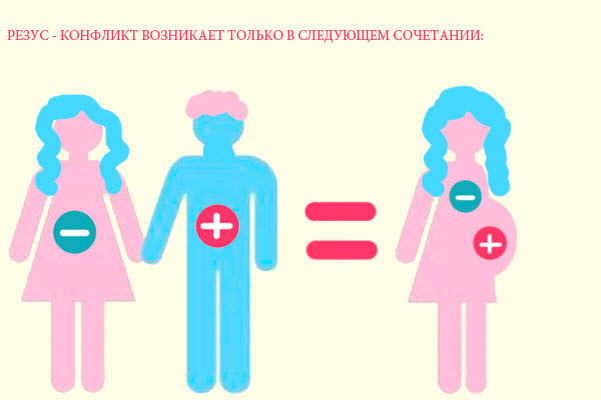Today we will tell you what the Rh conflict is and how it affects the mother's pregnancy. In everyday life, the presence of a negative or positive Rh blood does not affect the human body. However, it is a completely different matter when a couple with different Rhesus plans to have a baby. If partners have different Rhesus and their combination is inappropriate, a Rhesus conflict may occur during pregnancy.
Rhesus conflict, what is it?
So, the Rh factor is a special protein (antigen) that lies on the surface of red blood cells. A positive Rh in the blood group indicates the presence of this protein, and a negative Rh indicates its absence. According to statistics, about 85% of people are carriers of a positive Rh, the rest (15%) are negative.
Rhesus conflict can occur during a blood transfusion when the blood types match, but their Rhesus does not. Or in a woman’s body “in position” if she had Rh “-” (Rh-), and the fetus had Rh “+” (Rh +).
How does the Rh conflict behave in the mother's body?
Everyone knows the fact that the Rh factor and blood type are transmitted from parents to children when the nipples hurt. Thus, if a woman who has (Rh-) is going to start a family with a (Rh+) man, then there is a chance that the fetus will also have (Rh+). This can provoke a conflict of Rh in the mother's body.
During pregnancy, the body of the future mother and fetus is a single system. When fetal blood cells (erythrocytes) with the presence of protein (positive Rh) enter the female blood, which has a negative Rh, the female body perceives such cells as foreign. And the entire immune system begins to work on the elimination of these cells. The body produces antibodies to cleanse the baby's blood of foreign cells. The most severe consequence in this case may be the loss of a child.
The presence of an Rh conflict is typical in cases where the mother has a negative Rh (Rh-), and the father is positive (Rh +). Usually, in 75% of cases, the child and mother will be Rh incompatible and lymphocytes may be elevated.
But do not panic ahead of time! I will share my personal experience. My parents have different Rh conflict factors, besides (Rh-) from my mother. Doctors assured her that she would not be able to give birth. Despite this, my mother gave birth to two, with a difference of 3 years. My brother and I both got (Rh+) from our father. So, the Rhesus conflict took place. But my mother carried us safely and gave birth.
So if the future mother (Rh +), and the future father (Rh-) - this does not mean that they are not on the way in the family planning road.
Often, during the first pregnancy, there is no tangible conflict and the pregnancy should proceed normally. After all, the female body first encountered a positive Rh and did not develop many antibodies. Therefore, the likelihood of danger to the fetus is not high. Thus, the more often female cells are found with (Rh +) elements, the more antibodies are produced, which are stored in the memory of the woman's immune system. And in the subsequent "meeting", their development will occur several times faster and can bring danger to the child.
There, specialists will observe the course of pregnancy and Rh conflict will not give complications. In case of a possible Rhesus conflict, it is necessary (!) To be observed in the antenatal clinic. And if the presence of antibodies and their rapid growth (this is the Rhesus conflict) is detected in the expectant mother, she will be sent to a special perinatal center.
PS If you liked the article, please press the buttons of social networks.


Leave a comment